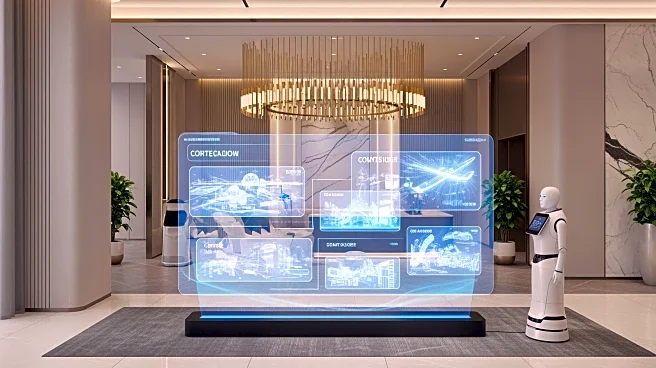What's Happening?
The landscape of hotel marketing is undergoing a significant transformation due to the evolving behavior of travel search and the influence of travel creators on platforms like YouTube. Traditional marketing strategies,
which relied on long-term campaigns and repeated ads to build brand familiarity, are becoming obsolete. Audiences now demand fresh content with every interaction, leading to a shift towards generating a high volume of diverse advertisements. This change is driven by the rise of AI, which enables the rapid creation of varied content, and the increasing role of travel influencers who shape consumer preferences and booking behaviors.
Why It's Important?
This shift in marketing strategy is crucial for the hospitality industry as it adapts to the changing expectations of consumers, particularly Gen Z, who are more engaged with social media and digital content. The ability to produce diverse and engaging content quickly is becoming a competitive advantage, as it aligns with the consumption habits of modern audiences. Hotels and marketers who fail to adapt may struggle to maintain relevance and engagement, potentially losing market share to more agile competitors. The integration of AI in content creation also democratizes the ability to produce high-quality marketing materials, leveling the playing field for smaller players in the industry.
What's Next?
As the demand for diverse content continues to grow, hotel marketing teams will need to embrace AI tools to keep up with the pace of content consumption. This may involve investing in new technologies and training staff to leverage these tools effectively. Additionally, collaborations with travel influencers could become more strategic, as their authentic content resonates well with audiences. The industry may also see a shift towards more transactional social media platforms, where the journey from inspiration to booking is streamlined, challenging traditional booking funnels.
Beyond the Headlines
The rapid pace of content consumption raises questions about the sustainability of current marketing practices. The pressure to constantly produce new content could lead to creative burnout among marketing teams. Moreover, the reliance on AI-generated content might dilute brand identity if not managed carefully. Ethical considerations around data privacy and the authenticity of influencer partnerships may also come to the forefront as these strategies become more prevalent.








